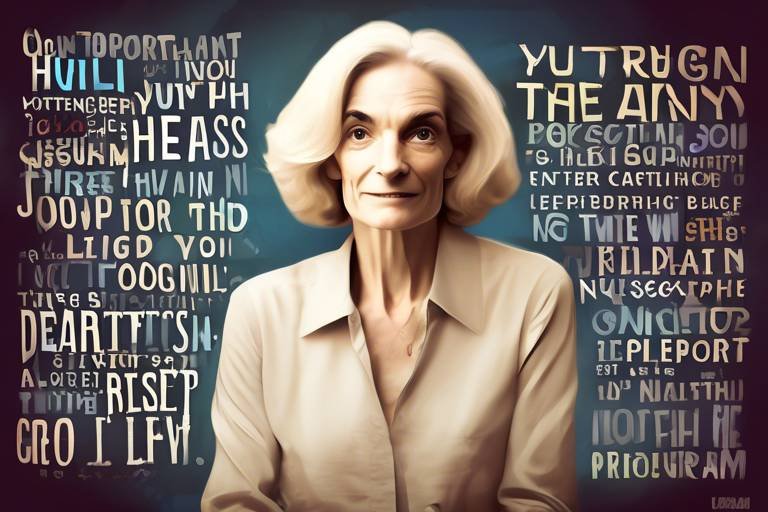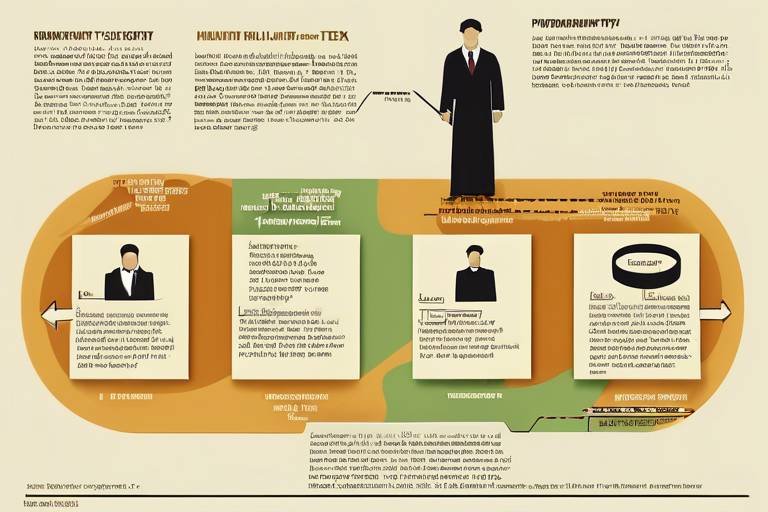Empowering Ideas from Philosopher Martha Nussbaum
Martha Nussbaum is not just a philosopher; she is a beacon of hope in a world that often feels chaotic and unjust. Her ideas resonate deeply, encouraging us to think critically about our lives and the society we inhabit. Imagine a world where every individual is empowered to reach their fullest potential, where social justice is not just a dream but a reality. Nussbaum's transformative ideas challenge us to reflect on our capabilities and responsibilities, urging us to foster a more inclusive society. Through her work, she emphasizes that the essence of a good life is not merely about wealth or status, but rather about the rich tapestry of human experiences and the ability to thrive as individuals and as a community.
At the core of Nussbaum's philosophy is the belief that understanding our emotions is vital for ethical decision-making. She argues that emotions are not just fleeting feelings; they are integral to our moral compass. By embracing our emotional experiences, we can cultivate a more compassionate society. This perspective is not only refreshing but essential in today's world, where empathy often takes a backseat to indifference. Nussbaum's insights encourage us to connect with others on a deeper level, fostering a sense of shared humanity that transcends superficial differences.
Moreover, Nussbaum's work on social justice and equality serves as a clarion call for those who believe in a fairer world. She argues that a just society must prioritize the capabilities of all individuals, especially those who are marginalized. This approach recognizes that everyone has unique strengths and challenges, and it is our collective responsibility to create an environment where all can flourish. By advocating for policies that address the needs of the most vulnerable, Nussbaum inspires us to envision a society where justice is not just an ideal but a lived reality.
Her emphasis on personal narratives is particularly powerful. Nussbaum believes that storytelling is a tool for empowerment, allowing marginalized voices to be heard and understood. When we share our stories, we create connections that bridge divides and foster empathy. This narrative approach not only enriches our understanding of others but also helps us to construct our identities in a more nuanced way. In a world that often seeks to categorize and label, Nussbaum’s philosophy invites us to embrace complexity and celebrate diversity.
In conclusion, Martha Nussbaum's ideas are not just theoretical musings; they are practical guides for living a more fulfilling and just life. By focusing on capabilities, emotions, and personal narratives, she equips us with the tools to navigate the challenges of modern society. Her work empowers individuals and communities alike to strive for a world that values every person's dignity and potential. So, let us take these empowering ideas to heart and work together to create a more inclusive and compassionate society.
- What is Martha Nussbaum known for?
Martha Nussbaum is known for her contributions to philosophy, particularly in the areas of ethics, social justice, and the capabilities approach, which emphasizes individual capabilities as essential to achieving a good life.
- What is the capabilities approach?
The capabilities approach is a framework developed by Nussbaum that focuses on what individuals are able to do and to be, highlighting the importance of personal development and social policies that enhance human flourishing.
- How does Nussbaum view the role of emotions in ethics?
Nussbaum argues that emotions are crucial for ethical decision-making, suggesting that understanding and integrating our emotional experiences can lead to more compassionate and just societies.
- Why is compassion important in Nussbaum's philosophy?
Compassion is central to Nussbaum's philosophy as it serves as a foundation for moral action and social responsibility, encouraging individuals to connect deeply with the experiences and struggles of others.

[The Capabilities Approach]
This article explores the transformative ideas of Martha Nussbaum, focusing on her contributions to philosophy, ethics, and social justice, and how they empower individuals and communities to foster a more inclusive society.
Martha Nussbaum's capabilities approach is a groundbreaking framework that shifts our understanding of what it means to live a good life. Rather than merely focusing on resources or outcomes, this approach emphasizes the importance of individual capabilities—the actual abilities and opportunities that people have to pursue their own version of flourishing. Imagine life as a garden; the capabilities approach is like ensuring that every plant has the right conditions to grow, rather than just dumping fertilizer and hoping for the best. It’s about nurturing the unique potential within each individual.
At its core, the capabilities approach argues that a just society must recognize and facilitate the diverse capabilities of all its members. This means providing the tools and opportunities necessary for every person to thrive. Nussbaum outlines a list of fundamental capabilities that she believes are essential for human dignity and well-being, including:
- Life: Being able to live a full life.
- Health: Having good health and access to healthcare.
- Education: Access to education that fosters critical thinking.
- Play: The ability to engage in leisure activities.
- Control over one’s environment: Having the power to influence one’s surroundings.
This framework doesn’t just highlight what individuals need; it also calls for a rethinking of social policies. Imagine if policymakers viewed their roles as gardeners, tasked with creating environments where all citizens can bloom. By prioritizing capabilities, we can develop policies that are not only fair but also transformative. For instance, rather than simply providing financial assistance, a capabilities approach would advocate for comprehensive support systems that include education, healthcare, and community resources. This holistic perspective can lead to greater human flourishing and a more equitable society.
Moreover, Nussbaum argues that this approach can be particularly empowering for marginalized communities. By focusing on capabilities, we can better understand the specific barriers that different groups face and work towards dismantling those obstacles. It’s like shining a light on hidden paths that lead to opportunity, allowing everyone to navigate their journey more effectively.
In summary, the capabilities approach is not just a philosophical concept; it’s a call to action. It encourages us to rethink our societal structures and prioritize the empowerment of individuals through the recognition of their unique capabilities. By doing so, we can foster a society where everyone has the chance to live a fulfilling and dignified life.
Nussbaum argues that emotions play a crucial role in ethical decision-making, suggesting that understanding and integrating our emotional experiences can lead to more compassionate and just societies.
Compassion is central to Nussbaum's philosophy, serving as a foundation for moral action and social responsibility, encouraging individuals to connect deeply with others' experiences and struggles.
Nussbaum believes that cultivating empathy is essential for ethical living, as it allows individuals to appreciate diverse perspectives and foster a sense of community and support.
Incorporating compassion into policy-making can lead to more humane and effective governance, aligning societal structures with the needs and capabilities of all individuals.
Nussbaum emphasizes the significance of personal narratives in shaping identity, arguing that storytelling can empower marginalized voices and foster understanding across different communities.
Nussbaum's work advocates for social justice and equality, arguing that a fair society must prioritize the capabilities of all individuals, particularly those who are often overlooked.
Exploring intersectionality, Nussbaum highlights how various forms of oppression intersect, necessitating a comprehensive approach to justice that addresses multiple dimensions of identity and experience.
Nussbaum's global perspective on justice encourages a broader understanding of human rights, advocating for policies that respect cultural differences while promoting universal dignity and capabilities.
Q: What is the capabilities approach?
A: The capabilities approach is a framework developed by Martha Nussbaum that emphasizes the importance of individual capabilities as the basis for assessing well-being and social justice.
Q: How does the capabilities approach apply to social policy?
A: It suggests that social policies should focus on enhancing individuals' capabilities rather than just providing resources, ensuring everyone has the opportunity to thrive.
Q: Why are emotions important in ethics according to Nussbaum?
A: Nussbaum believes that emotions are crucial for ethical decision-making, as they help us connect with others and understand their experiences, leading to more compassionate societies.

[Emotions and Ethics]
When we think about ethics, we often imagine cold, hard logic and rational decision-making. However, philosopher Martha Nussbaum challenges this notion by emphasizing the profound role that emotions play in shaping our ethical frameworks. According to her, emotions are not just fleeting feelings; they are integral to our moral lives. Nussbaum argues that emotions like compassion, love, and empathy are essential for ethical decision-making, allowing us to connect with others on a deeper level. This connection fosters a more just and compassionate society, where individuals are not merely seen as abstract entities but as real people with unique experiences and struggles.
Nussbaum's perspective invites us to reconsider how we approach ethics. Instead of viewing emotions as obstacles to rational thought, she suggests that they can serve as guides, helping us navigate complex moral dilemmas. For instance, when faced with a decision that impacts others, our emotional responses can provide valuable insights into the consequences of our actions. This leads to a more holistic understanding of ethics, one that incorporates both reason and emotion.
Moreover, Nussbaum highlights the importance of cultivating emotional awareness. By being attuned to our own emotions and those of others, we can develop a deeper sense of empathy. This emotional intelligence is crucial for ethical living, as it allows us to appreciate diverse perspectives and foster a sense of community. In a world where social divisions are prevalent, cultivating empathy can bridge gaps and promote understanding among different groups.
To illustrate Nussbaum's point, consider the following table that outlines the relationship between emotions and ethical decision-making:
| Emotion | Impact on Ethics | Example |
|---|---|---|
| Compassion | Encourages altruistic behavior | Helping a neighbor in need |
| Empathy | Fosters understanding and connection | Listening to a friend's struggles |
| Anger | Motivates action against injustice | Protesting against discrimination |
Incorporating emotions into our ethical framework doesn't mean abandoning rationality; rather, it's about finding a balance. Nussbaum argues that a truly ethical society must recognize the interplay between our emotional experiences and our moral responsibilities. This integration can lead to more compassionate policies and practices that take into account the needs and capabilities of all individuals.
In conclusion, Nussbaum's insights into the relationship between emotions and ethics compel us to rethink our approach to morality. By embracing our emotional experiences and recognizing their significance in ethical decision-making, we can cultivate a more compassionate and just society. So, the next time you find yourself grappling with a moral dilemma, ask yourself: how do my emotions inform this decision? This simple question can open up a world of understanding and connection.
- How do emotions influence ethical decision-making? Emotions provide insight into the consequences of our actions and foster empathy, which is crucial for understanding others' experiences.
- Can emotions lead to biased decisions? Yes, while emotions can guide us, they can also cloud judgment if not balanced with rational thought.
- What role does compassion play in ethics? Compassion serves as a foundation for moral action, encouraging individuals to connect with and support one another.

[The Role of Compassion]
Compassion is more than just a feeling; it’s a powerful catalyst for change. Martha Nussbaum emphasizes that compassion serves as a foundation for moral action and social responsibility. But what does that really mean? Think of compassion as a bridge that connects us to others, allowing us to share in their joys and sorrows. When we cultivate compassion, we not only enhance our own emotional intelligence but also create a ripple effect that can transform communities. It’s like planting seeds of understanding that bloom into a garden of support and empathy.
Nussbaum argues that when individuals connect deeply with the experiences and struggles of others, they are more likely to take action. This connection can manifest in various ways, from volunteering for local charities to advocating for policy changes that benefit marginalized groups. The essence of compassion lies in recognizing our shared humanity and responding to the needs of others with kindness and understanding. It’s about stepping outside of our own lives and seeing the world through someone else’s eyes.
In her work, Nussbaum highlights several key aspects of compassion that are crucial for fostering a just society:
- Understanding Emotions: Compassion begins with recognizing and validating emotions, both our own and those of others. This understanding helps us respond more effectively to the needs around us.
- Building Relationships: Compassion encourages us to forge deeper connections with others. These relationships can lead to stronger communities where everyone feels valued and supported.
- Encouraging Action: Compassion isn’t passive; it inspires us to act. Whether it’s through advocacy, support, or simply being there for someone in need, compassionate individuals are motivated to make a difference.
Furthermore, Nussbaum posits that integrating compassion into policy-making can lead to more humane and effective governance. Imagine a world where leaders prioritize compassion in their decisions—policies that not only address economic needs but also consider the emotional and psychological well-being of citizens. Such an approach would align societal structures with the needs and capabilities of all individuals, creating a more inclusive environment.
Ultimately, the role of compassion in Nussbaum's philosophy is about recognizing that we are all interconnected. In a society that often emphasizes individualism, compassion reminds us that we thrive when we support one another. It’s a call to action for each of us to contribute to a culture of empathy, understanding, and kindness. By fostering compassion in our daily lives, we can help build a world that is not only more just but also more vibrant and resilient.
Q1: How can I cultivate compassion in my daily life?
A1: You can start by practicing active listening, volunteering, and being mindful of the emotions of those around you. Small acts of kindness can go a long way.
Q2: Why is compassion important in leadership?
A2: Compassionate leaders are more likely to create inclusive environments, foster teamwork, and respond effectively to the needs of their employees, which ultimately leads to better organizational outcomes.
Q3: How does compassion relate to social justice?
A3: Compassion drives individuals to advocate for the rights and needs of marginalized communities, ensuring that everyone has access to the capabilities necessary for a good life.

[Cultivating Empathy]
In a world that often feels disconnected, cultivating empathy is more crucial than ever. Martha Nussbaum emphasizes that empathy isn't just a nice-to-have quality; it's a vital ingredient for ethical living and social harmony. Imagine walking in someone else's shoes, feeling their struggles, and understanding their joys. This ability to connect with others on a deep emotional level can transform our interactions and create a more compassionate society.
Nussbaum believes that empathy allows us to appreciate the rich tapestry of human experiences. It's like being a part of a grand orchestra, where every instrument plays a unique role, contributing to a beautiful symphony. When we cultivate empathy, we tune in to the melodies of others' lives, recognizing their distinct challenges and triumphs. This not only enriches our understanding but also fosters a sense of community and belonging.
To effectively cultivate empathy, we must engage in practices that promote emotional awareness and understanding. Here are some ways to nurture this essential quality:
- Active Listening: Pay full attention when others speak. This means putting away distractions and genuinely focusing on their words and emotions.
- Storytelling: Sharing personal experiences can bridge gaps between individuals. When we tell our stories, we invite others to see the world through our eyes.
- Reflective Practices: Engaging in mindfulness or journaling can help us process our emotions and connect with others' feelings more deeply.
Incorporating these practices into our daily lives can help us build a more empathetic society. When empathy becomes a guiding principle in our interactions, it encourages us to support one another, especially those who are marginalized or in distress. Nussbaum argues that this connection is not just about feeling for others; it's about taking action. Empathy should propel us toward social responsibility and inspire us to advocate for those whose voices often go unheard.
Furthermore, empathy in policy-making can lead to more humane governance. When leaders and policymakers prioritize empathy, they create systems that genuinely consider the needs of all individuals. Imagine a society where policies are crafted with compassion, taking into account the diverse experiences of its citizens. This approach can lead to more effective solutions that uplift everyone, particularly those facing systemic injustices.
Ultimately, cultivating empathy is not just an individual endeavor; it's a collective responsibility. By fostering a culture of empathy, we can build bridges across divides, promote understanding, and create a world that values every person's story. As Nussbaum eloquently puts it, empathy is the key to unlocking a more just and inclusive society.
- What is empathy? Empathy is the ability to understand and share the feelings of others, allowing us to connect on a deeper emotional level.
- How can I cultivate empathy in my daily life? You can cultivate empathy by practicing active listening, sharing stories, and engaging in reflective practices like mindfulness or journaling.
- Why is empathy important for social justice? Empathy helps us recognize the struggles of marginalized communities, motivating us to advocate for their rights and create more inclusive policies.
- Can empathy be taught? Yes, empathy can be nurtured through education, storytelling, and creating environments that encourage emotional expression and understanding.

[Compassion in Policy]
This article explores the transformative ideas of Martha Nussbaum, focusing on her contributions to philosophy, ethics, and social justice, and how they empower individuals and communities to foster a more inclusive society.
Nussbaum's capabilities approach emphasizes the importance of individual capabilities in achieving a good life, highlighting how this framework can guide social policies and personal development for greater human flourishing.
Nussbaum argues that emotions play a crucial role in ethical decision-making, suggesting that understanding and integrating our emotional experiences can lead to more compassionate and just societies.
Compassion is central to Nussbaum's philosophy, serving as a foundation for moral action and social responsibility, encouraging individuals to connect deeply with others' experiences and struggles.
Incorporating compassion into policy-making is not just an ethical imperative; it's a practical necessity. When policymakers approach issues with a compassionate lens, they can create systems that genuinely reflect the needs of the people they serve. Imagine a world where laws and regulations are crafted not solely based on statistics, but on the real-life stories of individuals affected by those policies. This shift in perspective can lead to more humane and effective governance.
For instance, consider how compassionate policies can reshape social services:
| Traditional Approach | Compassionate Approach |
|---|---|
| Focus on compliance and regulations | Emphasizes understanding individual circumstances |
| Limited engagement with communities | Encourages active participation and feedback |
| One-size-fits-all solutions | Tailored interventions based on specific needs |
By making policies more responsive to the emotional and social realities of individuals, we can create a society that not only acknowledges diverse experiences but actively works to uplift them. This means that policymakers need to engage with communities, listen to their stories, and understand their struggles. When people feel heard and valued, it fosters a sense of belonging and trust in the system.
Moreover, compassionate policy-making can also lead to innovative solutions. When we look at challenges through a compassionate lens, we often find that the best answers come from collaboration and empathy. For example, in addressing homelessness, rather than simply providing temporary shelters, a compassionate policy would consider long-term solutions that address the root causes, such as mental health support, job training, and affordable housing.
Ultimately, compassion in policy is about recognizing our shared humanity. It's about creating a society where everyone has the opportunity to thrive. When we prioritize compassion, we align societal structures with the capabilities and needs of all individuals, paving the way for a more just and equitable world.
Nussbaum emphasizes the significance of personal narratives in shaping identity, arguing that storytelling can empower marginalized voices and foster understanding across different communities.
Nussbaum's work advocates for social justice and equality, arguing that a fair society must prioritize the capabilities of all individuals, particularly those who are often overlooked.
Exploring intersectionality, Nussbaum highlights how various forms of oppression intersect, necessitating a comprehensive approach to justice that addresses multiple dimensions of identity and experience.
Nussbaum's global perspective on justice encourages a broader understanding of human rights, advocating for policies that respect cultural differences while promoting universal dignity and capabilities.
- What is Martha Nussbaum's capabilities approach?
Nussbaum's capabilities approach focuses on what individuals are able to do and to be, emphasizing the importance of personal development and social conditions that allow for human flourishing. - How does Nussbaum view the role of emotions in ethics?
Nussbaum believes that emotions are integral to ethical decision-making and that understanding our emotional experiences can lead to more just societies. - Why is compassion important in policy-making?
Compassion in policy-making leads to more effective governance by ensuring that policies reflect the real needs and experiences of individuals, fostering a more inclusive society.

[Narrative and Identity]
Martha Nussbaum profoundly understands the intricate relationship between narrative and identity. She posits that our personal stories are not just mere accounts of our lives; they are the very fabric that weaves together our sense of self. Think about it: how often do we define ourselves through the stories we tell? Whether it's the tales of our struggles, triumphs, or even mundane experiences, these narratives shape our identities and influence how we connect with others. Nussbaum argues that by sharing our stories, we not only affirm our own existence but also create a bridge of understanding with those around us.
In her view, storytelling is a powerful tool for empowerment, particularly for marginalized communities. When individuals from these groups share their experiences, they challenge the dominant narratives that often overlook or misrepresent them. This act of storytelling can be transformative, as it allows for a richer, more nuanced understanding of identity that goes beyond stereotypes. Nussbaum encourages us to listen actively to these narratives, as they provide essential insights into the lives of others, fostering empathy and compassion.
Moreover, Nussbaum emphasizes the importance of context in shaping our narratives. Our identities are not formed in isolation; they are influenced by our cultural, social, and historical backgrounds. This is where the concept of intersectionality becomes crucial. Just as different threads come together to create a tapestry, various aspects of our identities—such as race, gender, class, and sexuality—intersect to form a unique narrative for each individual. Understanding this complexity helps us appreciate the diversity of human experience and the importance of inclusivity in our societies.
To illustrate Nussbaum's ideas, consider the following table that outlines how personal narratives contribute to identity formation:
| Element of Narrative | Impact on Identity |
|---|---|
| Personal Experiences | Shapes self-perception and understanding of one's place in the world. |
| Cultural Background | Influences values, beliefs, and traditions, contributing to a sense of belonging. |
| Shared Stories | Fosters connections with others, creating a sense of community and support. |
| Intersectionality | Highlights the complexity of identity, revealing how different aspects interact and influence one another. |
By embracing the narratives of others, we not only enrich our understanding of the world but also challenge the prevailing norms that often marginalize certain voices. Nussbaum's call to action is clear: we must engage with these stories to create a more equitable society where everyone’s identity is acknowledged and valued. So, the next time you hear someone’s story, remember that it’s more than just words; it’s a glimpse into their identity, their struggles, and their triumphs.
- What is the significance of narrative in shaping identity? Narrative plays a crucial role in forming our identities, as the stories we tell about ourselves influence how we perceive ourselves and how others perceive us.
- How does Martha Nussbaum view the connection between storytelling and social justice? Nussbaum believes storytelling empowers marginalized voices, fostering understanding and empathy, which are essential for achieving social justice.
- What is intersectionality, and why is it important in understanding identity? Intersectionality refers to the interconnected nature of social categorizations, such as race and gender, which create overlapping systems of discrimination or disadvantage. It’s important because it helps us understand the complexities of identity and the unique experiences of individuals.

[Social Justice and Equality]
Martha Nussbaum's work is a beacon of hope in the ongoing struggle for social justice and equality. She passionately argues that a fair society must prioritize the capabilities of all individuals, particularly those who are often overlooked. Imagine a world where every person's potential is recognized and nurtured, where the inherent worth of each individual is celebrated. Nussbaum's vision challenges us to rethink our societal structures and to embrace a more inclusive approach that uplifts the marginalized.
At the heart of Nussbaum's philosophy is the belief that capabilities—the opportunities and resources available to individuals—are fundamental to achieving a just society. She proposes that true equality goes beyond mere legal rights; it involves ensuring that everyone has access to the means necessary for a fulfilling life. This perspective invites us to consider the practical implications of social justice:
- How do we ensure that education is accessible to all?
- What measures can be taken to provide healthcare for the underserved?
- How can we create economic opportunities for those in poverty?
By addressing these questions, we can begin to dismantle the barriers that perpetuate inequality. Nussbaum encourages us to view social justice as a dynamic process, one that requires ongoing reflection and action. Her approach is not just theoretical; it is deeply practical and rooted in the realities of human experience. She emphasizes that the capabilities approach is not merely an academic concept but a framework that can guide policies and practices aimed at promoting human flourishing.
One of the most compelling aspects of Nussbaum's work is her exploration of intersectionality. She highlights how various forms of oppression intersect, necessitating a comprehensive approach to justice that addresses multiple dimensions of identity and experience. For instance, consider how race, gender, and socioeconomic status can overlap to create unique challenges for individuals. Nussbaum argues that to achieve true justice, we must recognize these intersections and develop policies that are sensitive to the complexities of identity.
This understanding of intersectionality is crucial in crafting solutions that are not one-size-fits-all. Instead, we must tailor our approaches to meet the specific needs of diverse communities. Nussbaum’s insights remind us that social justice is not merely about addressing one form of inequality at a time but rather about understanding the interconnectedness of various injustices. By fostering a holistic view of justice, we can create a more equitable society that honors the dignity of every individual.
Nussbaum's global perspective on justice is another essential facet of her philosophy. She encourages a broader understanding of human rights, advocating for policies that respect cultural differences while promoting universal dignity and capabilities. In a world that is increasingly interconnected, her emphasis on global justice resonates more than ever. It challenges us to think beyond our borders and to consider how our actions can impact individuals in different parts of the world.
By advocating for a global approach to social justice, Nussbaum highlights the importance of solidarity and mutual support among nations. She argues that we must recognize our shared humanity and work collectively towards a world where everyone has the opportunity to thrive. This vision calls for a shift in how we perceive justice—not as a finite resource but as a shared goal that requires collaboration and understanding.
In conclusion, Martha Nussbaum's contributions to the discourse on social justice and equality are both profound and transformative. Her emphasis on capabilities, intersectionality, and global perspectives provides a comprehensive framework for addressing the injustices that persist in our world. By embracing her ideas, we can foster a society that not only acknowledges but actively works to uplift the voices and experiences of all individuals, paving the way for a more equitable future.
1. What is Martha Nussbaum's capabilities approach?
Nussbaum's capabilities approach emphasizes the importance of individual capabilities in achieving a good life, advocating for policies that ensure everyone has the resources and opportunities to flourish.
2. How does Nussbaum view the role of emotions in ethics?
Nussbaum believes that emotions are crucial in ethical decision-making, as they foster compassion and understanding, which are essential for creating just societies.
3. Why is intersectionality important in discussions of social justice?
Intersectionality is vital because it recognizes that individuals may experience multiple, overlapping forms of oppression, necessitating a comprehensive approach to justice that addresses these complexities.
4. How can we apply Nussbaum's ideas to policy-making?
Incorporating Nussbaum's ideas into policy-making involves ensuring that policies are compassionate and consider the diverse needs of all individuals, particularly those who are marginalized.

[Intersectionality in Justice]
Martha Nussbaum's exploration of intersectionality in justice is a profound reminder that the fight for equality is not a one-size-fits-all approach. Instead, it requires a nuanced understanding of how various identities—such as race, gender, class, and sexuality—intersect and create unique experiences of oppression and privilege. Imagine a tapestry, where each thread represents a different aspect of identity; when woven together, they create a complex picture that cannot be fully understood by examining each thread in isolation. This is the essence of intersectionality, and Nussbaum emphasizes its critical role in achieving a truly just society.
By acknowledging that individuals do not exist in a vacuum, Nussbaum argues for a comprehensive approach to justice that addresses the multifaceted nature of human experience. For instance, a woman of color from a low-income background faces different challenges compared to a white woman from an affluent family. These differences are not merely additive; they interact in ways that shape the lived realities of individuals. Nussbaum's insights urge policymakers and social advocates to consider these intersections when developing strategies to combat injustice.
One of the key elements of Nussbaum's argument is the need for inclusive dialogue. By bringing together voices from various backgrounds, society can better understand the complexities of injustice and work collaboratively towards solutions. This means creating spaces where marginalized voices are not just heard but actively shape the conversation. It's about ensuring that everyone has a seat at the table, particularly those who have been historically excluded. The challenge lies in recognizing our own biases and being open to learning from others' experiences.
To illustrate the importance of intersectionality, consider the following table that summarizes the different dimensions of identity and their potential impacts on social justice:
| Identity Dimension | Potential Impact on Justice |
|---|---|
| Race | Experiences of systemic racism can lead to disparities in opportunities and treatment. |
| Gender | Gender-based discrimination can affect access to resources, rights, and representation. |
| Class | Economic status can limit access to education, healthcare, and legal support. |
| Sexuality | Individuals may face unique challenges related to acceptance and legal rights. |
Nussbaum's perspective on intersectionality also highlights the importance of solidarity among various social movements. When different groups unite, they can amplify their voices and create a more formidable force for change. This solidarity is essential for dismantling the systemic barriers that perpetuate injustice. By understanding the interconnectedness of struggles, activists can develop strategies that benefit a broader range of individuals, fostering a sense of community and shared purpose.
Ultimately, Nussbaum's advocacy for intersectionality in justice serves as a call to action. It challenges us to look beyond our own experiences and recognize the diverse realities that exist within our society. By doing so, we can work towards a more equitable world where everyone’s capabilities are recognized and valued. The journey towards justice is complex and requires a commitment to understanding and addressing the intricate web of identities that shape our experiences.
- What is intersectionality? Intersectionality is a framework that examines how various social identities, such as race, gender, and class, intersect to create unique experiences of oppression and privilege.
- Why is intersectionality important in social justice? It is crucial because it helps to uncover the nuanced ways in which different forms of discrimination overlap, allowing for more effective and inclusive advocacy.
- How can I apply intersectionality in my activism? You can apply intersectionality by educating yourself on the diverse experiences of others, amplifying marginalized voices, and supporting policies that address multiple dimensions of identity.

[Global Perspectives]
Martha Nussbaum's approach to justice is not confined to local or national boundaries; rather, it extends its reach across the globe. She argues that understanding justice requires a global perspective that respects cultural differences while advocating for universal human dignity. Imagine a world where every individual, regardless of their background, is afforded the same opportunities to thrive. This is the vision Nussbaum paints, one that transcends geographical and cultural divides.
Nussbaum emphasizes that human rights should be viewed through a lens that appreciates the unique contexts of different societies. She believes that policies must be crafted not only with the intention of promoting equality but also with a deep understanding of local customs and values. This means that while we strive for a universal standard of rights, we must also be sensitive to the particular needs and aspirations of diverse communities. It's like trying to fit a square peg into a round hole; without proper context, even the best intentions can lead to ineffective solutions.
In her work, Nussbaum introduces the concept of the Capabilities Approach on a global scale, which asserts that every person should have the capabilities necessary to pursue a life they have reason to value. This approach can be particularly transformative in areas where social and economic inequalities are rampant. For instance, consider a country where women are systematically denied education. Nussbaum would argue that empowering these women through educational opportunities is not just a matter of fairness; it is essential for the overall flourishing of society. By investing in the capabilities of all individuals, we create a ripple effect that benefits entire communities.
To illustrate her point, let’s consider a few key areas where Nussbaum’s global perspective can make a significant impact:
- Education: Ensuring access to quality education for all, especially marginalized groups.
- Healthcare: Advocating for universal healthcare that addresses the specific health needs of different populations.
- Economic Opportunities: Creating policies that foster economic growth while considering the unique challenges faced by various communities.
Furthermore, Nussbaum's global perspective encourages dialogue among cultures. She believes that storytelling and sharing personal narratives can bridge gaps between different communities, fostering mutual understanding and respect. By listening to the experiences of others, we can dismantle stereotypes and build a more inclusive world. It’s like building a mosaic; each story adds a unique tile that contributes to a larger, more beautiful picture.
In summary, Martha Nussbaum’s global perspective on justice provides a comprehensive framework for addressing the complexities of human rights and social justice. By focusing on individual capabilities and recognizing the importance of cultural contexts, her ideas challenge us to rethink how we approach justice on a global scale. This is not just a theoretical exercise; it’s a call to action for policymakers, activists, and individuals alike to advocate for a world where everyone has the opportunity to flourish, regardless of their circumstances. The journey towards a more just society is long, but with Nussbaum's insights, we can take meaningful steps in the right direction.
Q: What is the Capabilities Approach?
A: The Capabilities Approach is a framework developed by Martha Nussbaum that emphasizes the importance of individual capabilities in achieving a good life. It suggests that social policies should focus on enhancing individuals' abilities to pursue their own version of a fulfilling life.
Q: How does Nussbaum view emotions in ethical decision-making?
A: Nussbaum argues that emotions play a crucial role in ethical decision-making. She believes that understanding and integrating our emotional experiences can lead to more compassionate and just societies.
Q: What role does compassion play in Nussbaum's philosophy?
A: Compassion is central to Nussbaum's philosophy, serving as a foundation for moral action and social responsibility. It encourages individuals to connect deeply with others' experiences and struggles.
Q: How does Nussbaum's work address social justice and equality?
A: Nussbaum advocates for social justice and equality by prioritizing the capabilities of all individuals, particularly those who are often overlooked in society. She emphasizes the need for a comprehensive approach to justice that addresses multiple dimensions of identity and experience.
Frequently Asked Questions
- What is Martha Nussbaum's capabilities approach?
Martha Nussbaum's capabilities approach is a philosophical framework that emphasizes the importance of individual capabilities in achieving a fulfilling life. It suggests that social policies should focus on enhancing people's abilities to live well, rather than merely providing resources or income. This approach advocates for a more inclusive society where everyone has the opportunity to flourish.
- How does Nussbaum view the role of emotions in ethics?
Nussbaum argues that emotions are integral to ethical decision-making. She believes that understanding our emotional experiences can lead us to make more compassionate and just choices. By acknowledging our feelings, we can connect with others on a deeper level, fostering a more empathetic society.
- Why is compassion important in Nussbaum's philosophy?
Compassion is at the heart of Nussbaum's philosophy. She posits that it serves as a foundation for moral action and social responsibility. By encouraging individuals to empathize with the struggles of others, compassion helps build a sense of community and motivates people to take action for social justice.
- What does Nussbaum mean by cultivating empathy?
Cultivating empathy, according to Nussbaum, is essential for ethical living. It allows individuals to appreciate diverse perspectives and understand the experiences of others. This practice not only enriches personal relationships but also strengthens societal bonds, creating a supportive environment for everyone.
- How can compassion influence policy-making?
Nussbaum believes that incorporating compassion into policy-making can lead to more humane and effective governance. When policymakers consider the needs and capabilities of all individuals, they create structures that support the well-being of the entire community, rather than just a select few.
- What role do personal narratives play in Nussbaum's work?
Nussbaum emphasizes the significance of personal narratives in shaping identity. She argues that storytelling can empower marginalized voices and promote understanding across different communities. By sharing experiences, individuals can foster connections and challenge prevailing stereotypes.
- How does Nussbaum address social justice and equality?
Nussbaum advocates for social justice and equality by prioritizing the capabilities of all individuals, especially those often overlooked. She believes that a fair society must ensure that everyone has access to the resources and opportunities necessary for a good life, regardless of their background.
- What is intersectionality in the context of Nussbaum's philosophy?
Intersectionality, as explored by Nussbaum, refers to the interconnected nature of various forms of oppression. She highlights the need for a comprehensive approach to justice that considers the multiple dimensions of identity and experience, ensuring that policies address the unique challenges faced by different groups.
- What are Nussbaum's views on global justice?
Nussbaum's perspective on global justice encourages a broader understanding of human rights. She advocates for policies that respect cultural differences while promoting universal dignity and capabilities. Her work emphasizes the importance of recognizing our shared humanity in addressing global challenges.



















